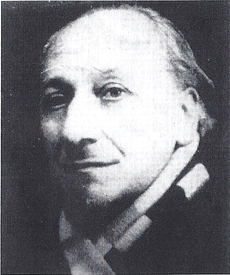Henri Mulet

Henri Mulet was a French composer, organist, harmonium and cello player. He was born on 17 October 1878 in Montmartre under the shadow of Sacré-Coeur Paris, France, and died on 20 September 1967 in Draguignan, France. Mulet came of age assisting his father, the maître de-chapelle of the neo-Byzantine Basilica of the Sacré-Cœur, by playing harmonium at the church. His mother taught piano and organ, and played the harmonium of the Basilica. The basilica was then under construction and the installation of the grande orgue years in the future. He was an enigmatic character, and somewhat eccentric. Because of his lack of correspondence, few friends, and solitary lifestyle, information regarding his life is limited. Although he lived for 88 years, he composed music only during about 15 of them.
Most of his published compositions were for the organ. His works for organ have been called "expressive in a post-Romantic manner.
He won first prize for cello in Delsart's class in 1893. He won second prize for organ in 1897. He studied organ with Guilmant and Widor. He served as an organist in several churches in Paris {choirmaster of the basilica of Sacré-Coeur, Paris and titular organist at St Pierre-de-Montrouge (until 1901), St Eustache, Ste Marie des Batignolles (1910), St Roch (1912), and finally St Philippe du Roule in Paris}. He was a professor at the Ecole Niedermeyer and at the Schola Cantorum.
In 1937 Mulet burnt most of his manuscripts (giving some of his orchestral manuscripts to Félix Raugel), and left Paris for Draguignan in Provence. He also owned a house overlooking Frejus, which he shared with Madame Mulet's sister and mother.
Was he unhappy with the liturgical change which had begun to undermine church music? Was he bitter over the ascendant modernism of the time? Was he disillusioned by lack of recognition as composer? We can only guess. He put his ideas in "Les tendances et antireligieuses néfastes de l'orgue moderne" (published in 1922). In it, he declared himself an opponent of the modern trends (in his eyes) of reprehensible organ playing, that increasingly broke away from worship in the Catholic Church. In the attached "Étude sur le role des mutations et la composition rationelle du Plein-Jeu dans un grand orgue", he unfolded his thoughts about the technical sides of the organ, that he expressed in the restoration of the organ of the Église Saint-Philippe-du-Roule in the Rue du Faubourg-Saint Honoré. That, was to his wishes, carried out by the organ builder Charles Mutin.
He served as organist at the cathedral in Draguignan until 1958, and afterwards he entrusted himself to the care of the nuns at the establishment there (Les Petites Soeurs des Pauvres). He was married (to Isabelle) but had no children. He spent the last 30 of his 89 years in seclusion. By the time of his death, he had been completely forgotten, and not one French newspaper printed his obituary. Most of his surviving music is largely unknown.
In a tribute to Mulet, Charles Tournemire wrote: "Henri Mulet, a strange and great artist, captive of a mystic ideal. A calm improviser, some times lively, some times religious. An artist worthy of the great epoch of the Masters of the Middle Ages, which, in his case, would not exclude an understanding of present-day art. A mysterious thinker".
Original source of this article is the Henri Mulet page at the Classical Composers Database (from January 2004), which was written by Ioannis Dimitroulis. Updated by the author on January 24th, 2014.
Works
Organ
- Méditation religieuse, 1896?
- Prière, 1902?
- Carillon-Sortie, 1912?
- Esquisses Byzantines (10 pieces), 1914–19. This group of pieces was inspired by "elements" of the Sacré-Coeur Basilica in Paris. They are inscribed "En mémoire de la Basilique du Sacré-Coeur de Montmartre, 1914-1919". They were published in 1920.
- Offertoire funèbre
- Petit offertoire
- Sortie douce
- Offertoire sur un Alléluia grégorien, pour la fête du Très-Saint-Rosaire
Harmonium
- Angelus (a transcription of his earlier orchestral work "San Salvator").
- Offertoire
- Sortie
Orchestral
- Dans la vallée du tombeau (Souvenir de Lombardie), symphonic poem, 1908
- La Toussaint, symphonic poem, 1909
- Fantaisie pastorale, 1911
- Paysage d’hiver
- Paysages crépusculaires
- Scherzo-Marche
- Petite suite sur des airs populaires français
- Souvenirs de Lombardie
Vocal
- O mon Jésus (hymn), 1900
- L’aigu bruissement, voice and piano, 1904
- Laudate dominum, four voices and organ, 1904
- Soleils couchants, voice and piano, 1904
- Ave Maria, three voices & organ, 1910
- Les deux étoiles, voice and piano, 1910
- Le dernier des Maourys, voice and piano, 1911
- Le talion, voice and orchestra, 1912 (on a text by LeConte de Lisle).
Chamber and instrumental
- Danse afghane, piano, 1904
- 2 noëls, oboe or clarinet & piano, 1904
- Danse persane, piano, 1910
- Petit lied très facile, harpsichord or piano, 1910
Principal publishers: Leduc, Senart
Sources
- Michel Duchesneau. L'avant-garde musicale et ses sociétés à Paris de 1871 à 1939. Sprimont: Editions Mardaga, 1997
- F. Sabatier: ‘Henri Mulet’, Guide de la musique d’orgue, ed. G. Cantagrel (Paris, 1991), 605–6
- Les tendances et antireligieuses néfastes de l'orgue modern. Congres General de Musique Sacree, Strassbourg 26-31 Juillet 1921.
- Étude sur le role des mutations et la composition rationelle du Plein-Jeu dans un grand orgue, Strassbourg 26-31 Juillet 1921.
External links
- Facebook group: https://www.facebook.com/groups/351113691115/
|